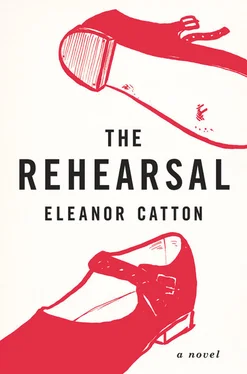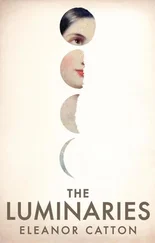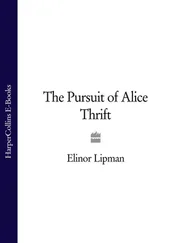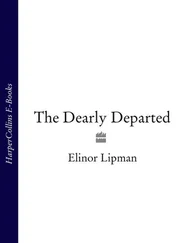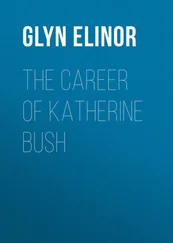“It would change what everyone says about me at school.”
“What does everyone—”
“That I like girls,” Julia says loudly. The collar of her school shirt is open and the hollow V of her neck is turning an angry stippled red.
“How?”
“Because if there was some tragic story behind it all,” Julia says, “it would be like a reason or a cause. Like with that girl Victoria.”
“Isolde’s sister.”
“Yeah,” Julia says hotly. “Isolde’s sister. Whatever she does now, if she goes off the rails or whatever, and ends up sleeping with a billion people and drinking heaps and failing all her exams, people won’t think that she’s just a loser or a slut. They’ll know it’s because she’s damaged , because there’s a reason behind everything, which is that she was raped. Whatever she does from now on will just be evidence. So it’s kind of like she’s free. She can do anything and she won’t be responsible. She’s got a reason .”
“That’s a very interesting way of looking at it,” the saxophone teacher says.
“ I want a reason,” Julia says. “If it turned out that I was damaged, then it wouldn’t be my fault anymore. It wouldn’t be something gross, it would be something tragic. It would be an effect —an effect of something out of my control. I’d just be a victim.”
“You all want to be damaged,” the saxophone teacher says suddenly. “All of you. That is the one quality all my students have in common. That is your theme and variation: you crave your own victimhood absolutely. You see it as the only viable way to get an edge upon your classmates, and you are right. If I were to interfere with you, Julia, I’d be doing you an incredible favor. I’d be giving you a ticket to authorize the most shameless self-pity and self-adoration and self-loathing, and none of your classmates could even hope to compare.”
“Yes, that’s exactly what I’m saying,” Julia says.
The two of them look at each other in silence for a moment.
“What details would you choose to include?” the saxophone teacher says. “Those sharp mosaic-sliver details that would line your alibi like the tight angled coins on a chain-link vest.”
“Nothing physical, at first,” Julia says. “That would be too obvious. The lie would shine too brightly, and they’d find me out. Something psychological. Something insidious and dripping. Some slow erosion that in the end would be far worse, far more subtle and damaging, than any quick backstage fumble or teasing slap.”
“It’s still going to be a lie, Julia,” the saxophone teacher says. “At the heart of it. You won’t be satisfied. At bottom, all it will be is a lie.”
“How do you know?” Julia says. “How do you know how you have influenced me? How do you know I’m not damaged? How do you know I don’t nurse some small criticism, some throwaway comment that you made and have now forgotten but I remember every time I stumble or I fail? A tiny something that will dig deeper and deeper, like a glass splinter working its way from my finger to my heart? Some tiny something that will change the shape of me forever—how can you know?”
For once the saxophone teacher has nothing to say. She looks out the window at the birds.
Wednesday
The saxophone section of the Abbey Grange jazz band is gap-toothed now: first Victoria, who has chosen not to return, and then Bridget, who never will. The cavities have been filled with lesser players, and the chairs shuffled a fraction closer to tighten the curve.
“Bridget would have really liked this,” says first trombone every now and again, knowing that dead people are always very sentimental and always full of joy and appreciation for the simple things. Some of them still weep, not for Bridget, who was unmemorable, but for themselves, imagining that they themselves had died, and how irreplaceable they would be.
The school’s Christian group was tight lipped and private about the sacking of Mr. Saladin and its aftermath; on the subject of Bridget’s death it blossoms. A man’s powerful and senseless attraction to a girl he had been instructed to protect is a human mystery. More marketable is the divine mystery of this one lampless girl mown to extinction in the dewy dark: it is right up their alley, and the Christian group thrives. Advertisements for prayer groups spring up around the school. Enrollments for youth camps run a record high. A Christian pancake stand appears in the quad at lunchtime, managed by a zealous few who roll the pancakes in lemon and sugar and shine brightly with an inner light. They don’t hand out tracts or wise words or a summons to a better life. They hand out pancakes. It’s enough. Soon many of the girls are exchanging their plastic Fuck-me bracelets for nylon bands that invite them, in mnemonic, to consider what a grown man might do if he were one of them, if he were faced with the same choices and confounded by the same desires. Bridget herself had been a sometime member, a wearer of a nylon commitment band—this is a comfort, the girls agree, as they mutely beg their own salvation and reach sideways for each other’s hands.
The lunchtime youth group shifts from a classroom to the school hall to cater for the swell in numbers, and with the counselor long since returned to his frosted cubby between the bursar and the nurse, the youth leaders rise to take his place. They conclude that, in all likelihood, He would do just as they are doing now, and as they regard their bracelets they feel a throb of satisfaction that they possess the single correct answer to the rhetorical question stitched around the band.
In a sense, Bridget comes to eclipse Victoria after all. Victoria’s questionable victimhood, the all-too-visible streak of her own reciprocation cannot, in the end, compete with the indubitable victim of a roadside smash. But the posthumous Bridget is not a singular and universal notoriety, celebrated as Victoria had been celebrated, herself the symbol and the locus of her fame; Bridget is an instrument, subtler and more pliable and vastly more diffused. It’s the best she could have hoped for.
“There was a girl at my high school who died,” the girls will say, years later. “She was hit on her bike coming home from work. God, it was sad. It really affected us, you know? All of us. I hardly knew her, but even so. It was so sad.”
Tuesday
“That’s it, then,” Patsy said, when the saxophone teacher received her teaching diploma. They looked at it, stamped with a blue watermark, silvered and inked and glossy under its pane of glass. “That’s it,” Patsy said, “you’re damned. A lifetime of the world assuming that you are a spinster, a closed thin-lipped efficient spinster who lies spangled and lock-jawed in her bed at nights and has no love or pleasure to light the room. It’s the one truth about music teachers, and everybody knows it: they are alone, always alone, limp and graying in their cold offices and waiting in the dark for their next student like a beggar waiting for a meal. Congratulations!”
They touched glasses lightly and drank.
“But you’re not a spinster,” the saxophone teacher said. She was still looking at the shining diploma, tracing the words with her eyes.
“But everyone still assumes. Or a lesbian. If they are generous, then they assume I am a lesbian.”
“That’s why she asked for that ring,” Brian said, pointing to the penultimate finger on Patsy’s left hand. “She said, Make it the biggest fattest old diamond you can get your hands on. This isn’t just a symbol, it’s a whole bloody advertising campaign.”
“And this is what you came up with,” Patsy said, waving her hand and making a disgusted face, as if the ring was worth nothing. They laughed.
Читать дальше
